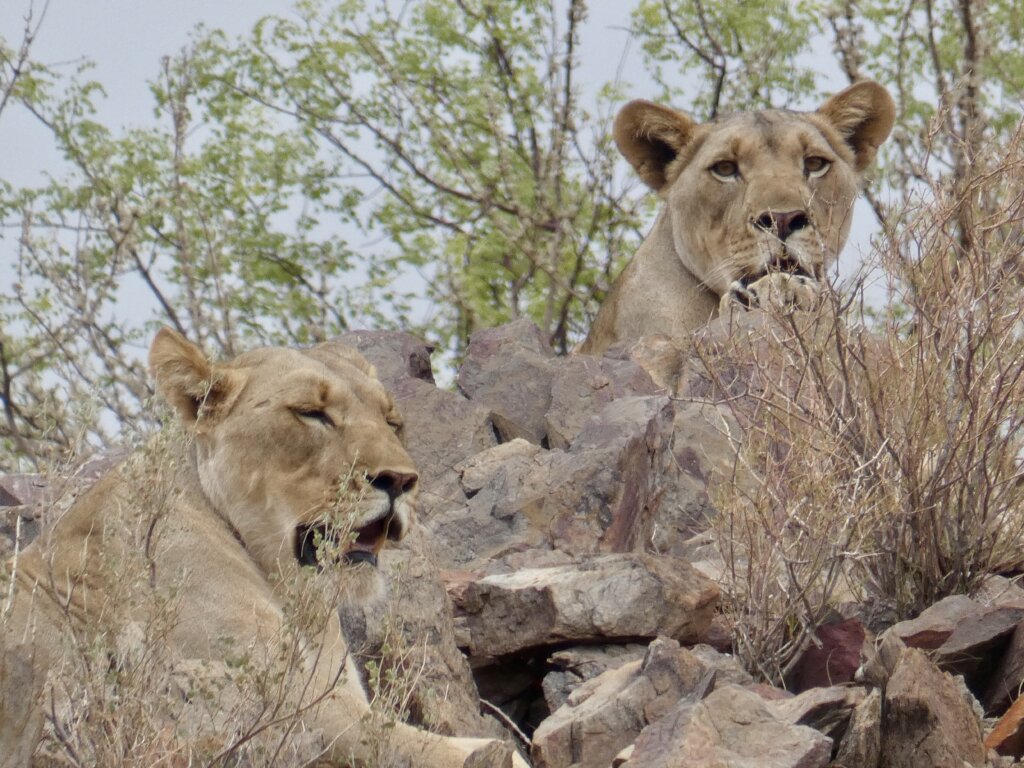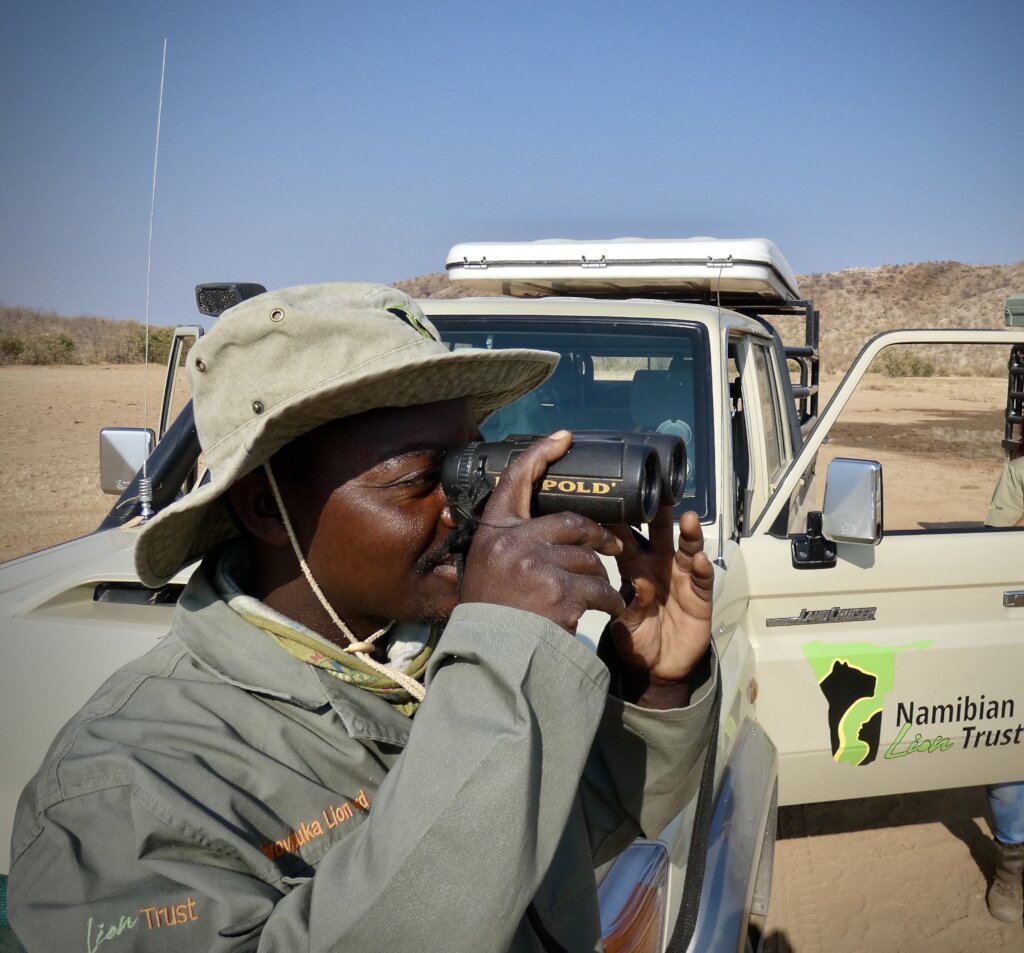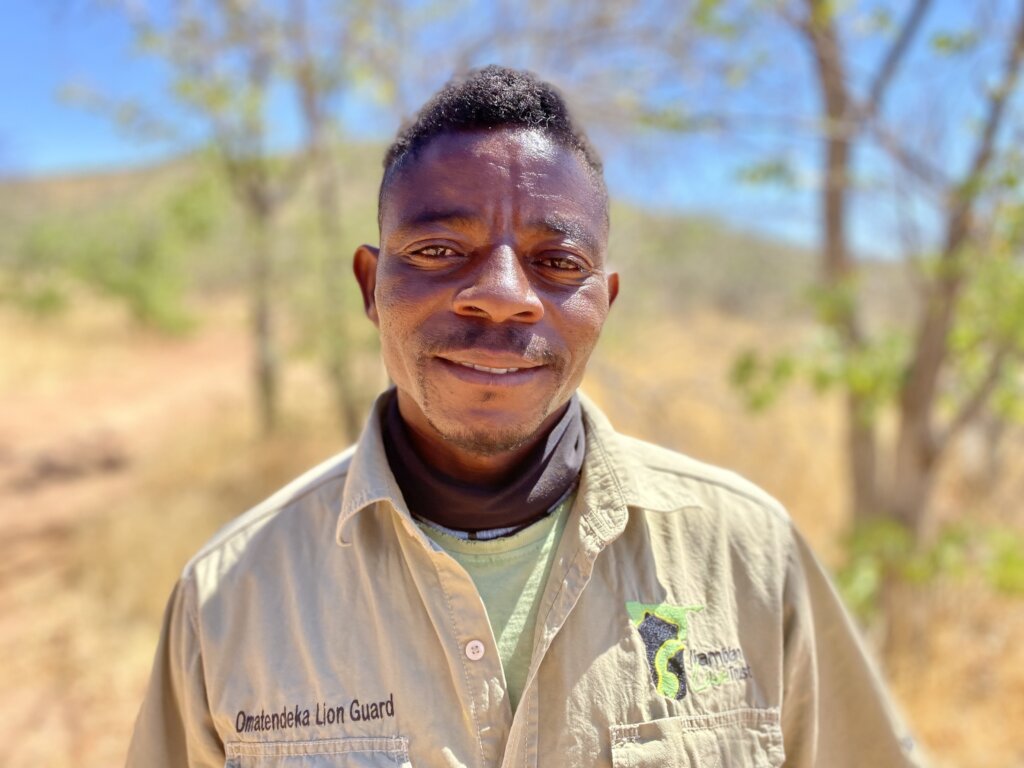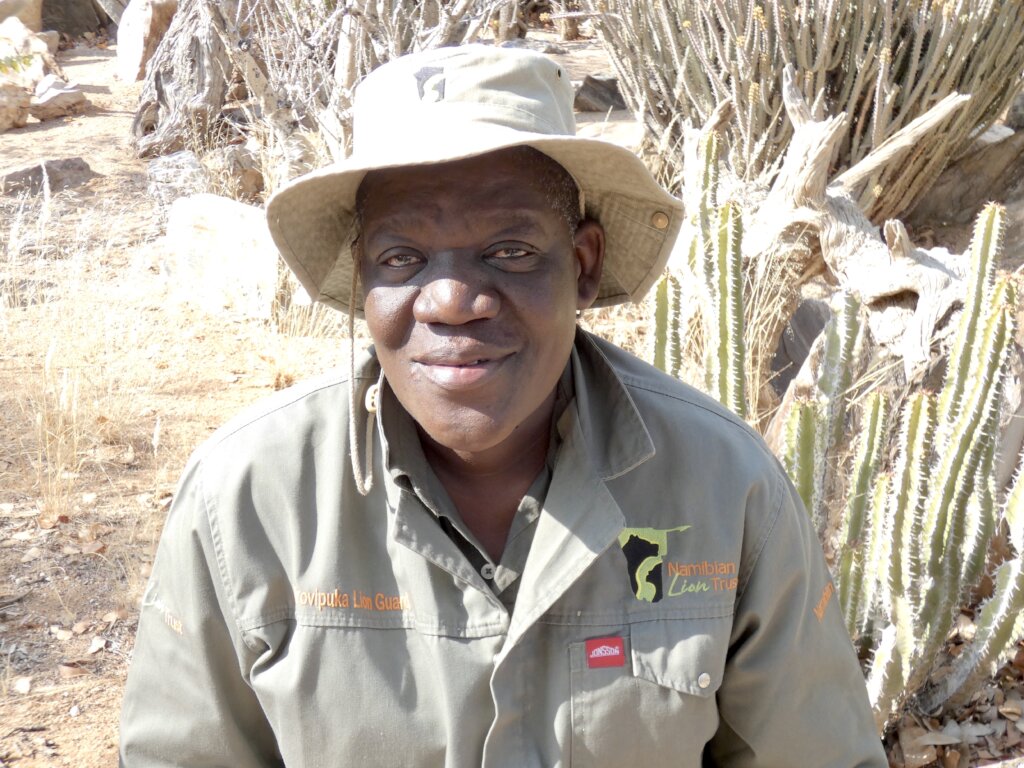By Tammy Hoth-Hanssen | Founder of Namibian Lion Trust
GlobalGiving Donation: GPS-Sat Collar monitoring Lion ID Npl-27, Lion Guard Salaries & Food Parcels
Thanks to the generous GlobalGiving donation to the Kevin Richardson Foundation July 2021, we continue to:
1. Monitoring Lion, ID # Npl-27: this includes vehicle patrols, fuel
On 27 August 2021, we successfully fitted a new GPS-Satellite collar to Npl-27, a male in his prime at approx. 7-8 years of age. His approx. 560 km2 range includes the Otjijapa / Okavariona Springs, within the safety of an Exclusive Wildlife Zone. Location fixes from the GPS-Satellite collar indicate that at times, when following antelope herds, Npl-27 and his pride move into adjacent livestock farming areas. Our Lion Guard Teams increase patrols in the immediate area to mitigate lion-farmer conflict. After nine years of drought, the first good rains fell in this area during February 2022.
2. Supporting Lion Guard Wages & providing Food Parcels:
2.1. Uezekandavi Nguezeeta:
Fondly known as Kandavi, joined the Namibian Lion Trust as a Lion Guard in 2015. He patrols an area of approx. 80 km2, adjacent to the Hobatere Concession, an extension to the west of the Etosha National Park. Mostly on foot, Kandavii covers vast areas of inhospitable terrain, mitigating conflict between livestock farmers, lion, and other large carnivores. His determination to protect Conservancy wildlife, especially the Hobatere lions when they follow the Hartmann’s Zebra herds out of the safety of the Park onto neighbouring farmland, is commendable. Kandavi has watched the Hobatere lioness named Ai, raise two sets of cubs; she recently shifted her home range onto communal farmland adjacent to this Protected Area, making his commitment to protecting her & her offspring from farmer retaliation, more challenging.
2.2. Rinoveni Tjauira:
Joined our team in 2019 and is proud of his role as Lion Guard in the Omatendeka Conservancy, one of the most pro-active in lion conservation. Despite high livestock losses to predation, his Conservancy believes in the protection of all wildlife, also conflict species such as elephant and predators. His dedication to protecting lions from persecution became clear when he helped weigh a male lion during a collaring exercise. “Touching that sleeping lion changed the way I see them today”. Renoveni never misses an opportunity to patrol his area, diligently completing his monitoring and data collection forms. Renoveni is well-liked by his peers and has shown great leadership potential during Lion Guard Training Courses.
2.3. Jackson Kavetu: “I love to see the lion cubs in our Conservancy, as this shows me that our lions are healthy” – NLT senior Lion Guard, Jackson Kavetu.
Jackson became a Conservancy Game Guard when he was a young man and has been a dedicated lion conservationist ever since. He joined the Namibian Lion Trust in 2012. As a First Responder when calls for support come in from the field, his passion for wildlife protection motivates him to do all he can, to minimize conflict between farmers and carnivores. Married, with three school-going children, Jackson farms goats on communal land close to Etosha’s border. His successful livestock protection methods are testimony to the efficacy of the Namibian Lion Trust’s practical, workable systems.
2.4. Naphtalie Awarab:
As a child, Naphtalie remembers the challenges of farming livestock in areas where wildlife such as lion and elephant roam. His family’s cattle, goats & donkeys fell prey to predators that leave the Etosha National Park. Naphtalie’s knowledge of the natural world gained as a young herdsman, is an asset to the Namibian Lion Trust as is his passion for mechanics and brickwork. He has three children, the youngest is Ivan, who is in grade 5 and hopes to become a pilot once he completes his schooling.
Our Lion Guards, are dedicated to protecting the lion as well as mitigating farmer-lion conflict in Namibia’s north-west (Kunene Region).
The Lion Guards:
- assist in locating within the study area, the lion to be fitted with GPS-Satellite tracking collars that provide invaluable data at 2-hourly intervals (the intervals may be set according to need);
- monitor the whereabouts of both collared and uncollared lion in order to establish movement patterns and, together with the data retrieved from the widely dispersed trail cameras within their area and lion-sightings by community members, the Lion Guards are able to forewarn farmers who live in conflict zones (‘hot-spots’);
- when the Early-Warning System (EWS) detects lion movement or when an incident is reported, the Lion Guards (who form the Rapid Response Unit) move out to support the affected farmer or community as well as to protect the lion;
- their night- and / or day-time patrols contribute to the protection of both the livestock and the villagers;
- the collection and evaluation of valuable information on lion whereabouts, livestock management as well as lion and livestock mortalities, provides for reliable reporting and assessment.
The Lion Guards contribute towards greater understanding and acceptance of wildlife. This takes time and patience, with many hours spent ‘under-tree’, meeting with farmers and traditional leaders to discuss workable solutions. By providing guidance and encouragement, they help the farming community to adopt our Livestock Protection Programme, which includes employing herdsmen and protecting their livestock at night. Last but not least, Lion Guards identify communities in need of our support and livestock protection ‘bomas’. Together with the Ministry of Environment, Forestry & Tourism (MEFT) and the Department of Veterinary Services staff, they patrol & repair Protected Area fence-breaks, also reporting on poaching and other illegal activities.
The work of a Lion Guard is never done: a change of heart & mind-set, attitudes and behaviour, especially ‘modernizing’ age-old farming practices, takes time, determination and steadfastness... but will bring us all one step closer to co-existence between man and lion.
Cultivating greater tolerance and appreciation of Namibia’s wildlife amongst the younger generation will determine what world we leave behind for the next generation, and what that generation we leave behind for the world…
We thank GlobalGiving & the Kevin Richardson Foundation for their tireless devotion to all things ‘wild’ – their enthusiastic support of Namibian Lion Trust keeps us ‘out there’, doing what we do best.
Yours in Conservation
Tammy Hoth-Hanssen
Project reports on GlobalGiving are posted directly to globalgiving.org by Project Leaders as they are completed, generally every 3-4 months. To protect the integrity of these documents, GlobalGiving does not alter them; therefore you may find some language or formatting issues.
If you donate to this project or have donated to this project, you can receive an email when this project posts a report. You can also subscribe for reports without donating.



